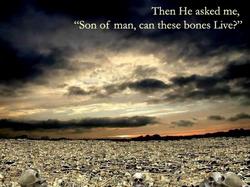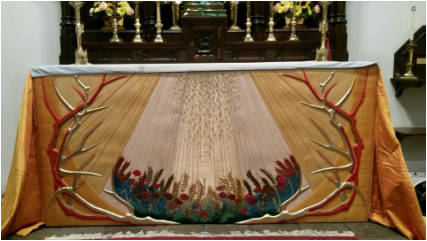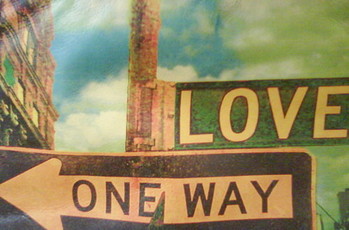|
The one thing that’s good about a valley of dry bones is that at least you can’t kid yourself. At least you know you don’t have any other options but resurrection. One of the main tricks human beings use to avoid the risk of dealing with the Holy Spirit is convincing ourselves that we have plenty of other options. …We can do this! (Whatever it is.) We can handle it without needing God to get involved. But not in a valley of dry bones. I don’t think there was some skeleton in that valley saying, “If we just start a dry bones revitalization committee….” “If we just hire a consultant.” No, really, we’ll be OK. Pay no attention to all these bones. It’s no big deal. There comes a point where you can’t say that anymore, and the community Ezekiel is talking to is at that point. Have you seen Monty Python and the Holy Grail? Do you remember the scene with the Black Knight? He takes very seriously the importance of this major bridge he is fixated on controlling, which is actually just a silly little plank across a creek, and he is determined to prevent King Arthur from crossing it. They do battle, but no matter what injuries he sustains, the Black Knight keeps pretending he isn’t losing. At one point, despite the fact that King Arthur has chopped off both his arms, he insists “It’s just a flesh wound.” See, there is nobody in this scene from Ezekiel insisting it’s just a flesh wound. And that’s a good thing.  The silly human habit of convincing ourselves that whatever our problem is, surely by definition it must be the kind of thing we can handle, is usually almost unshakable. We all, fallen creatures that we are, tend to think that way, building up these illusions of self-reliance. We might look to God for a little spiritual enhancement, if that’s the kind of thing that interests us, but most of us find it seems normal to set our sights and construct our values in a way that nearly all the things we actually shape our lives around are things we can convince ourselves we ought to be able to handle. But in this passage from Ezekiel, that illusion has at last been shattered. The house of Israel, as Ezekiel likes to call this group of exiled Jews he’s writing to, has lost their homeland to the enemy and seen their city destroyed. Everything they trusted has proved powerless, including religion, love of country, and their own competency. They can’t handle this. And interestingly, their reaction to that is not to call on God. Because when you get that far into the habit of not treating God as ultimate, you sometimes lose the ability to notice ultimacy itself. You live with a lowered horizon. You can’t imagine God active and involved; you can’t conceive of the kind of issues and realities that only God can do something about. He’s just not functionally in the picture. That’s a very common attitude, and they’re no exception. What do they say about their situation? Do they say, “O Lord, please help us. We have nothing but you”? No, they say, “Our bones are dried up, and our hope is lost; we are cut off completely.” They have given up. There’s no way out, they say. Nobody could fix this. There is the endpoint of functionally living without God, without ultimacy. So Ezekiel is given a tour of this endpoint by God in a vision. Those of you who pray the Daily Office, either by coming to Morning and Evening Prayer here or by doing it at home, know that we’ve already been reading along in Ezekiel this week. This must be one of his most famous pieces of writing, though, and I want us to look at it. God takes him to a valley, and the valley is full of bones, and not just bones but dry bones, piles upon piles of them, and just for good measure Ezekiel adds, “And they were very dry.” And then God asks him a question. Mortal, can these bones live? We all know the answer, right? No. According to every habit of thought and every method we functionally use to operate in this life, the answer is no, of course they can’t live. They’re bones. Don’t be ridiculous. Our bones are dried up, and our hope is lost; we are cut off completely. No, they can’t live. Ezekiel knows that’s the answer, but he also knows about ultimacy. He knows just enough about the out of the box and uncontrollable way God operates that he is able to imagine that something beyond what he can conceive of might be possible. Mortal, can these bones live? His response is magnificent: O Lord God, you know. Do you hear how that decenters him? Decenters us? We are no longer the ones forming an opinion about how to manage our situation. We are no longer the Black Knight defending our little bridge. We give up. O Lord God, you know. What does God do next? He asks Ezekiel to exercise trust, to speak out something that seems impossible if you have a lowered horizon. Then he said to me, "Prophesy to these bones, and say to them: O dry bones, hear the word of the Lord. I will cause breath to enter you [the same Hebrew word as Spirit, there], and you shall live. I will lay sinews on you, and will cause flesh to come upon you, and cover you with skin, and put breath in you, and you shall live.” And then the spine-tingling last line of what Ezekiel is to say to the dry bones that are his people: “and you shall know that I am the Lord." If only they could have known that all along. If only we could know it. If only I could know it. So Ezekiel does it. He exercises trust in God and speaks this message to the bones. Kudos to him; I probably would have felt like such an idiot I never would have opened my mouth. He speaks that prophecy, that promise of life, and it says suddenly there was a noise, a rattling, and the bones came together. I looked, and there were sinews on them, and flesh had come upon them, and skin had covered them. So the valley’s full of bodies now, not just bones, but there’s a problem. They’re still just as dead as before. It says there was no breath in them. Again, breath is the same word as Spirit is the same word as wind. There was no Spirit, no breath, no life; just corpses. And so God tells him now to speak to the breath. And again, as weird as it looks, he exercises enough trust to do it. Thus says the Lord GOD: Come from the four winds, O breath, and breathe upon these slain, that they may live." I prophesied as God commanded me, and the breath came into them, and they lived, and stood on their feet, a vast multitude. And then God gives him the payoff. Here is what he reveals: He is opening their graves and bringing them up from them. He is doing for them, he says, what they can’t possibly do for themselves. O my people, I will put my spirit within you and you shall live. And then he says it again, those spine-tingling words: And you shall know that I am the Lord. If only they could have known that all along. If only we could know it. If only I could know it. I will put my spirit within you and you shall live, and you shall know that I am the Lord. If we want to know that today, we have an advantage over Ezekiel. We are immensely blessed to have access to something Ezekiel never had access to, which is the fulness of the Holy Spirit as an indwelling gift. Our tradition tells us that that possibility only entered the world on Pentecost, when God poured out his Spirit, birthing the church. Pentecost is the ultimate, cosmic fulfillment of the promise God told Ezekiel to speak over those dry bones. On that day we heard about in Acts 2, God sent his breath, his spirit, his life into that band of Jesus’ disciples in a way nobody had ever received it before, and when they received it they realized that until that moment, they had been dead. Even though that language of being dead – and it’s strong imagery! – is all through the New Testament, I think this realization very often happens for people retroactively; it’s only by contrast with the life of the Spirit that we look back and say “Before this, in any way that means anything, I was a valley of dry bones. I thought I was living the good life. I thought what counted was that I was a success, a good person, a model of professionalism, a loving mom or a devoted son. I thought that was all there was. But from this point of view, looking back through this resurrection life of Jesus poured into me through his Spirit, I was dead. It wasn’t just a flesh wound. I had nothing. My bones were dried out, I was cut off completely, and the Easter life that God gave me through his Spirit wasn’t something I could do. Only God can do it. There is ultimacy after all, and it is in God.” I was listening earlier this month to a podcast by a twenty-something Episcopal priest in Houston named Sarah Condon, and in it she talks about the ongoing process of getting that message, of letting it sink in that God is the Lord and his risen life is his to give, just a completely different order than anything we could produce or earn. It’s a process which she calls “hard, wonderful, painful and necessary.” She goes on: “It’s absolutely that alarming for me. I find myself realizing, after all these years, that when we sing Amazing Grace, how sweet the sound that saved a wretch like me, I’m not actually talking about everyone else in the room. …We are all dead, and by God’s grace, our pain, sin and horror has been pried from our cold dead hands.” Your bones are dried out, you are cut off completely, but I will put my spirit within you and you shall live, and you shall know that I am the Lord. After Pentecost, by the power of the Spirit, we might actually be able to know that. You, and I, and all of us, might come to know it. We might even come to know it, as they say, in our bones.
0 Comments
 I was completely blown away when I got to church this week and, for the first time, saw the Sarum all-seasons frontal on the altar. Not only because I think it’s beautiful, with its thorns and wheat and its golden rays of light, but because it seemed to me to carry some message I needed to know more about. So I went to our parish history to see what Jane Lemon, the artist from England who designed it, intended this frontal to symbolize about Emmanuel. As many of you know, these Sarum hangings were specially commissioned for us and based on her living and praying in the parish for 2 weeks. Let me read sections of her artist’s statement to you. “The wheat reminds us of the prairies and symbolizes growth in Christ… as seen in the parish’s mission and ministry. The poppies on the other hand are symbols of the indifference which can be our comfortable reaction, but the wheat overcomes the poppies. The (red) thorns which frame the altar frontal symbolize the problems which surround this city parish, (but) [t]he positive way the parish works with [the neighborhood] is reflected in the golden thorns, good coming out of evil. The rays falling on the wheat represent God’s love and grace …at work in the parish.”  “In this is love, not that we loved God, but that he loved us. God is love, and those who abide in love abide in God and God abides in them. We love because he first loved us.” John seems to be saying the same thing over and over throughout much of his first epistle, and it’s all about love. Love is an overused word in contemporary English: overused, and over-general. It can apply to everything from your mother to your spouse to frozen custard to your favorite old sweater to a cute cat video you first saw three minutes ago. If we form our idea of love from examples like those, it is almost guaranteed that we will miss John’s point when we read this epistle. The Greek word being used for love here is a term that refers not to enjoyment, not to romance, not to friendship, not to hearts and flowers, not to warmth or affection, not really to any feeling at all. It refers to an attitude or posture that we find first and foremost in the very nature of God: utterly selfless goodwill and action for the benefit of another. Unconditional benevolence without regard to the deserving of the recipient. Putting the other first at your own cost. A retired Episcopal priest I talked with two weeks ago in New York likes to use the term “one way love” for this – the endless, unconditional self-giving that comes naturally only to God. Unmerited goodwill which does not for one moment expect or need any return. |
Archives
July 2024
Categories |

 RSS Feed
RSS Feed